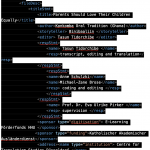This gallery contains 2 photos.
This post will hopefully help you to get a general understanding of what coding a TEI file in XML language is and what it’s good for. Please note that I am definitely not an expert on this topic, and I … Continue reading



